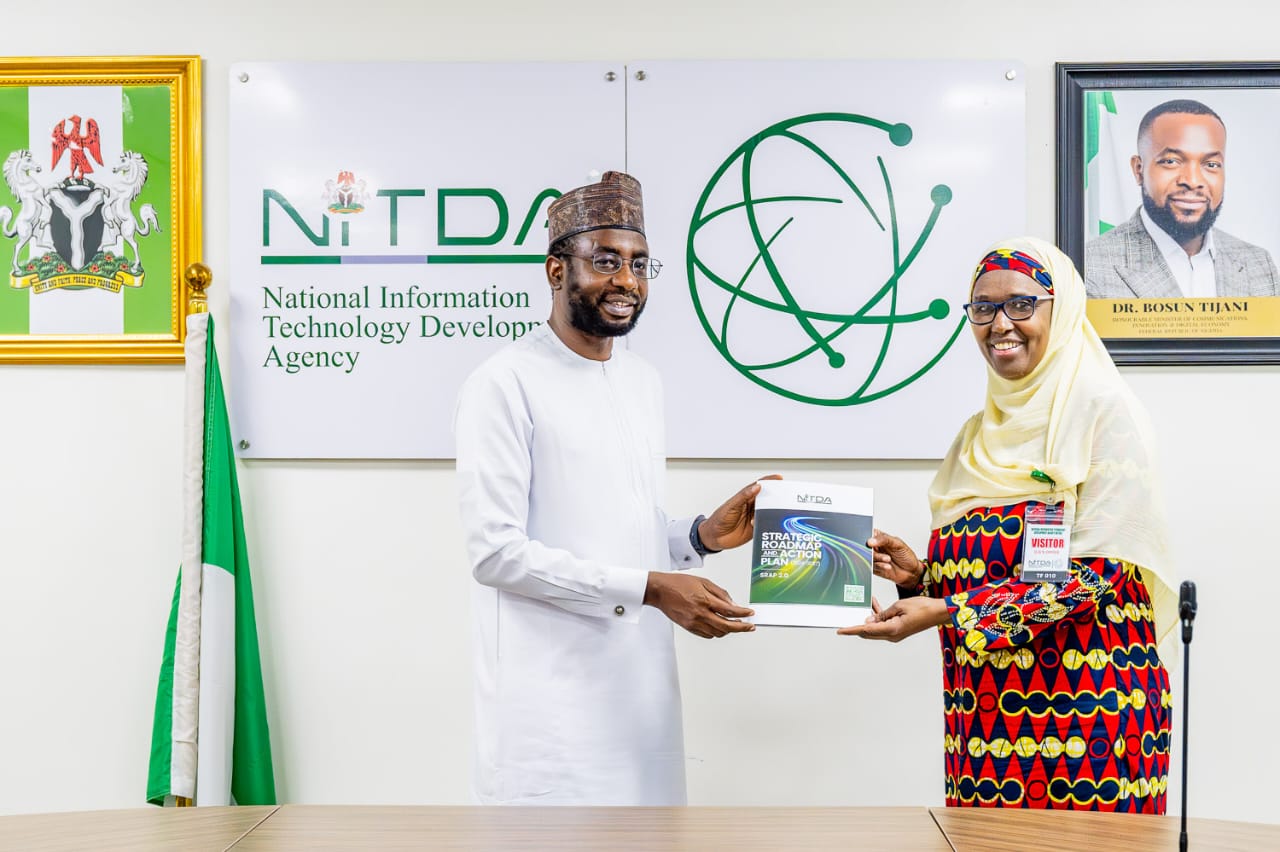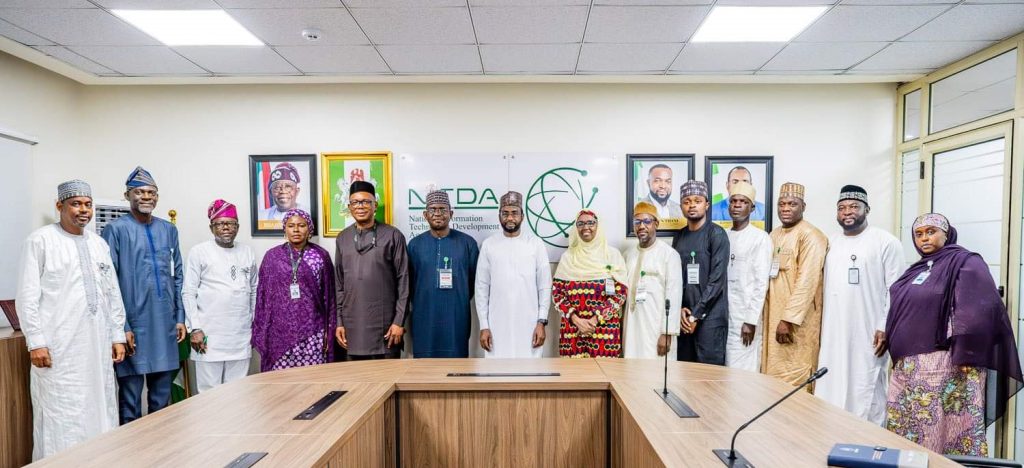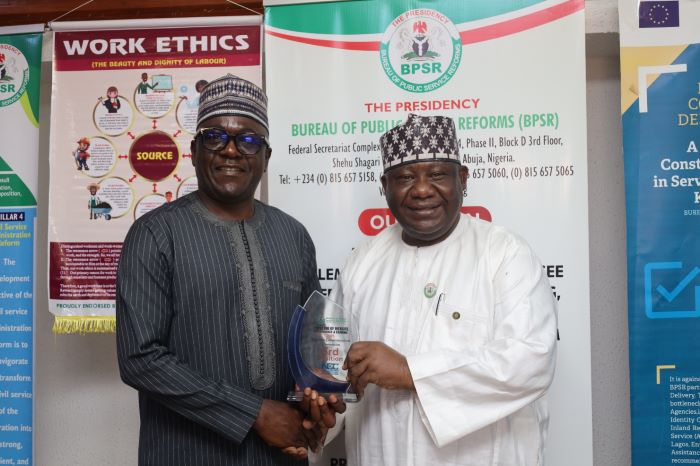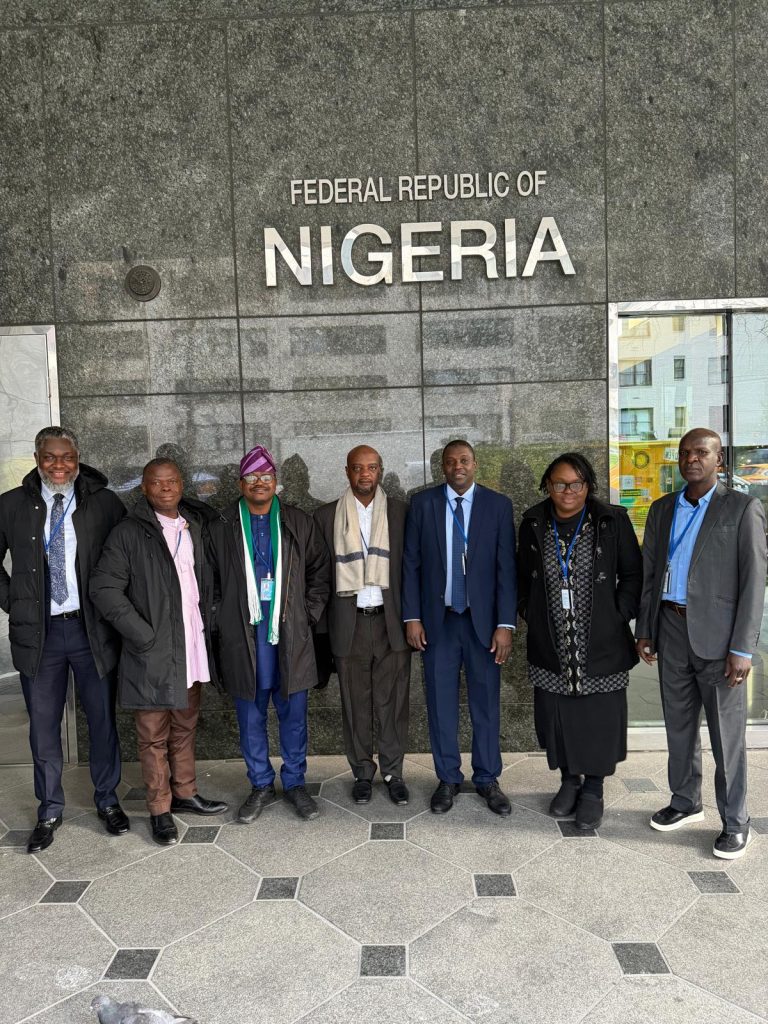
DG NITDA, Kashifu Inuwa CCIE (left) presenting the agency’s SRAP 2.0 document to the Director, ACEPHAP, Prof. Hadiza Galadanci (right) at the corporate headquarters of NITDA in Abuja
The National Information Technology Development Agency (NITDA), is set to partner with the Africa Centre of Excellence for Population Health and Policy (ACEPHAP) in transforming healthcare delivery in Nigeria through technological innovations; which is a continued effort to implement the presidential priority areas, particularly on education, health, and social investment by strengthening their capacities through digital innovation and inclusive access to technology.
Director-General of NITDA, Kashifu Inuwa, disclosed this when a delegation from the ACEPHAP led by its Director, Professor Hadiza Shehu Galadanci visited him at the Corporate Headquarters of the Agency to discuss possible areas of collaboration.
Inuwa outlined a comprehensive plan to leverage technology as an enabler across all critical sectors in Nigeria, with a particular focus on healthcare while emphasising that technology is not a standalone sector but an essential tool that enhances productivity and innovation across all sectors.
The DG stated that the administration of President Bola Ahmed Tinubu GCFR has prioritised healthcare by utilising technology to achieve significant development in the sector while enumerating the Agency’s pillars of its Strategic Roadmap and Action Plan (SRAP 2.0) in creating a thriving digital ecosystem that benefits all sectors.
“Healthcare is key to us, and the President is also big and loud on it, so we have crafted our strategic roadmap and action plan which has 8 pillars to achieve significant milestones in the sector,” he noted.
Speaking on the first pillar which is to Foster Digital Literacy and Cultivate Talents, he said that the agency has set an ambitious target of achieving 95 percent digital literacy by 2030 with a mid-term target of 70 percent by 2027 and has consequently rolled out the Digital Literacy for All programme which aims to infuse digital skills into the national academic curriculum in collaboration with the Ministry of Education.
He also noted additionally that there are plans to train 3 million Nigerians in high-demand IT skills through various initiatives including partnerships with platforms like Coursera.
“We aim to increase the digital fluency of our citizens. Everyone should be able to use digital devices safely and responsibly as well as to build our proficiency so that we can build our digital offerings in the country,” he added.
Inuwa gave valuable insights on various strategic initiatives the agency has been implementing which the visitors can leverage to create a vibrant healthcare sector in alignment with the other SRAP pillars which are to Build a Robust Technology Research Ecosystem, Strengthen Policy Implementation and Legal Frameworks, Promote Inclusive Access to Digital Infrastructure and Services, Strengthen Cybersecurity and Enhance Digital Trust, Nurture Innovative and Entrepreneurial Ecosystem, Forge Strategic Partnerships and Collaborations and lastly, Cultivate a Vibrant Organisational Culture and an Agile Workforce in NITDA.
While noting that the agency is investing in the research of 6 emerging technologies; AI, IoT, Robotics, UAVs, Blockchain and Additive Manufacturing, he mentioned that the goal is to establish centres of excellence in geopolitical zones to foster innovation and collaboration.
“Based on that, we would do the site readiness assessment for the equipment you need, and you can do it for any or all of the identified emerging technologies with your focus on healthcare,” he stated.
While emphasising the importance of ensuring the privacy of patients’ data, Inuwa averred that “Cyber security is critical to whatever you do because even the patients need to be sure of the integrity, availability and confidentiality of their information because as you digitise, you need to make sure their data are secured.”

He also disclosed that through the Nigeria Startup Act, NITDA has been supporting startups with incentives and resources to foster innovation. He added that the Agency encourages startups to register and benefit from those initiatives to boost their growth and scalability.
Speaking on forging strategic partnerships and collaboration, he hinted that the Agency engages with academia, corporate organisations, entrepreneurs, venture capitalists and government entities to build a cohesive innovation ecosystem.
The NITDA boss added that the multi-stakeholder approach ensures diverse perspectives and resources to contribute to Nigeria’s digital transformation.
While noting that the collaboration betwee is a transformative step in the right direction, Inuwa asserted that adoption of AI tools in enhancing medical research and diagnostics is an innovative approach towards transforming healthcare delivery in Nigeria.
Inuwa mentioned recent collaborations, such as with E-Health Africa, which utilises AI tools like ChatGPT to enhance medical research and diagnostics. This innovative approach is part of a broader strategy to develop local AI-driven solutions that can transform healthcare delivery in Nigeria.
In her earlier remark, Prof. Galadanci expressed optimism about the future while envisioning a long-lasting relationship with NITDA that will drive transformative change in the healthcare sector.
Highlighting the centre’s focus on healthcare entrepreneurship and innovation, she shared success stories from their healthcare entrepreneurship boot camp and pitching event in 2023 where young innovators were identified in Kano and supported with seed grants to further develop their ideas.
The centre’s Director noted that the collaboration would translate research into impactful policies and foster a culture of innovation and entrepreneurship among students, faculty and healthcare professionals.
“We sincerely hope this will be the beginning of a long-lasting relationship and partnership that will translate to the true meaning of the quadruple helix in the quest to address the rights of healthcare challenges through technology, innovation and entrepreneurship in Nigeria and Africa,” she remarked.




